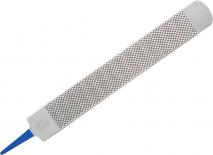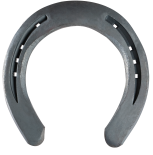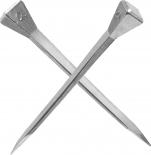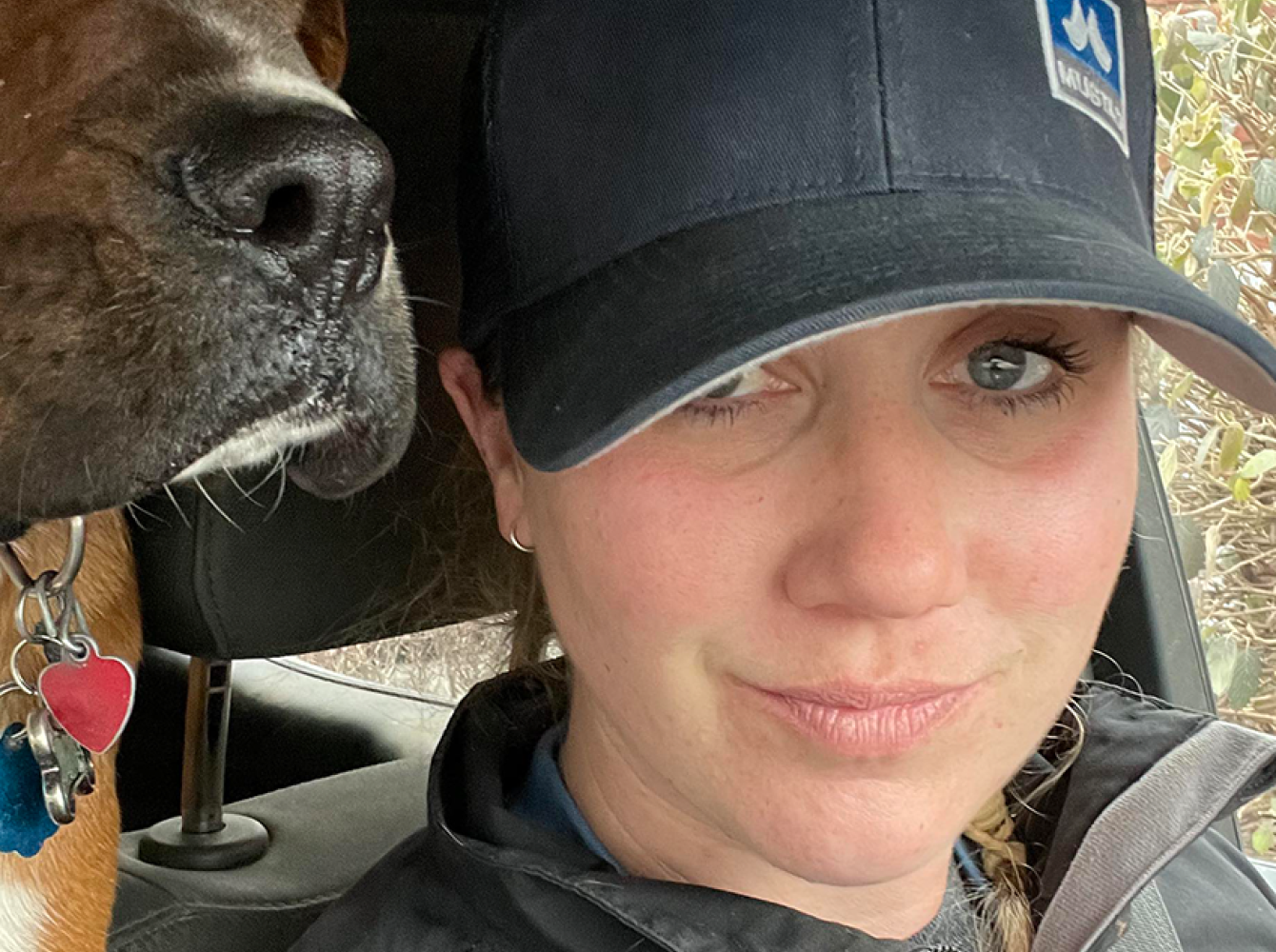
Meghan Coyle, CJF
“Eleven years in, the education is still not enough. I want to know more, I want to be better.” Meghan Coyle started out wanting to help people. She found her calling helping horses instead.
Helping those who can’t help themselves
As a teenager, Meghan Coyle felt called to help people who couldn’t help themselves. And since her twin brother has Asperger’s, she’s passionate about supporting anyone who struggles to communicate.
In fact, Meghan decided to become a social worker when she was in high school, working fast and hard toward that goal. By junior year in high school, she was already taking classes at the University of Vermont. By junior year in college, she was working with nonverbal clients.
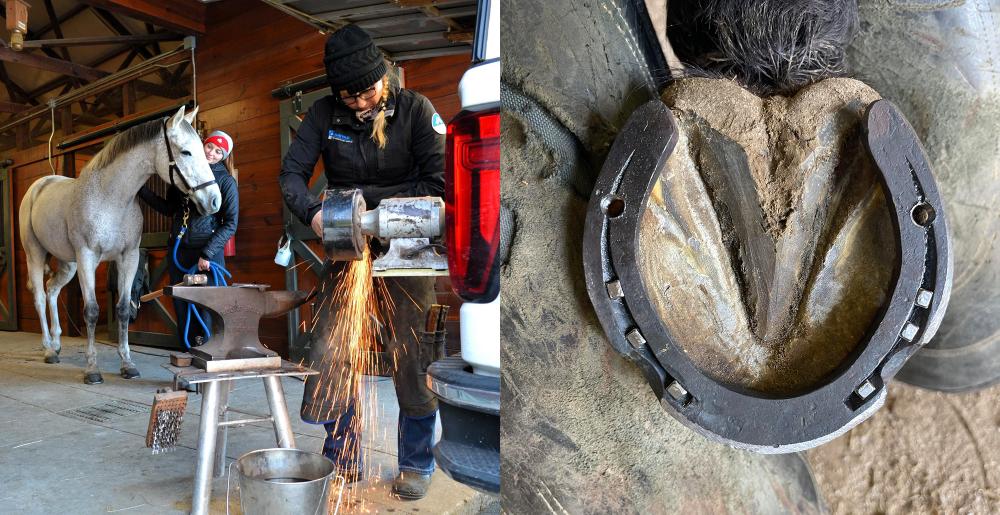
Unfortunately, that career has a high burnout rate, and Meghan saw it firsthand.
Meghan realized this career path wasn’t sustainable, and she considered becoming a veterinarian instead. It was an obvious choice—she loved horses—she’d mucked stables and cleaned hotel rooms to pay for riding lessons as a girl. But Meghan knew she’d be in her late thirties before she could even start practicing, and that road was too long.
Meanwhile, Meghan’s horse had been struggling with lameness. She’d witnessed firsthand how her farrier solved the problem, working closely with her vet. Meghan was fascinated.
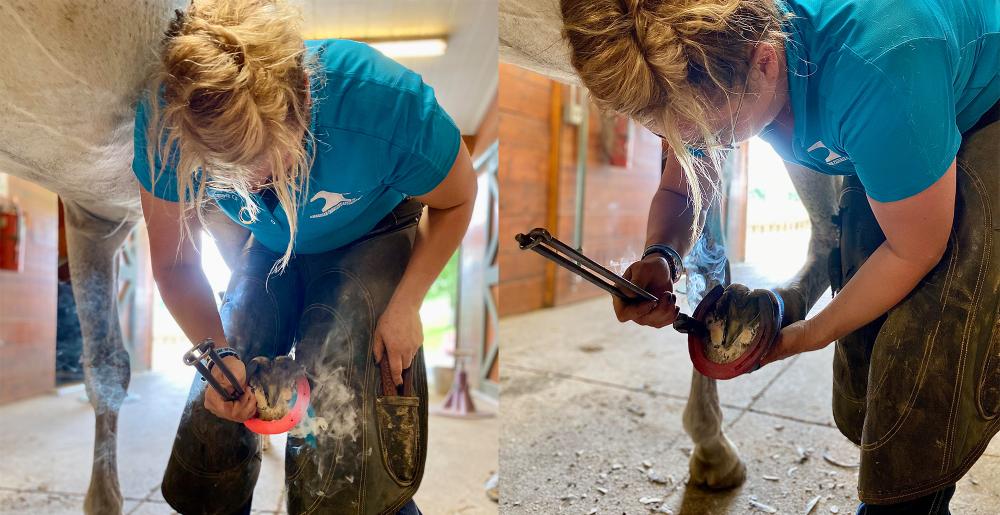
How does one become a farrier?
“Did you go to school for this?” she asked. He had, in fact.
Meghan realized becoming a farrier could turn her love of horses into a career while fulfilling her calling to help those who couldn’t speak for themselves.
Before long, Meghan had quit her job in social work, sold her belongings, left her beloved dog with her mother in Vermont, and overcome her fear of flying to board the first airplane of her life and get herself to farrier school in Illinois.
On her first weekend at Illinois Horseshoeing School, Meghan gazed out her window, watched a field of horses, and thought, “This is where I want to be.”
My back was sore. My hands were blistered. I didn’t have any fingerprints left.
A few weeks later, she was ready to quit.
Reality hit fast. The work was hard. It was dangerous. It was physical. And she was pretty sure she was failing. She called her mom, crying. “I want to come home. I don’t think this is right for me.” Reluctantly, Meghan agreed to stick it out for two more weeks.
The longer she stayed, the more Meghan was learning. She gained skills, she remained to the end, and she now remembers school as an amazing experience. But on the last day of her program, Meghan was in tears again.
She was sure she would fail and wouldn’t be successful.
That day, her mentor, Steve Sermersheim, asked her a question that has stuck with Meghan even now: “What if you don’t fail?”
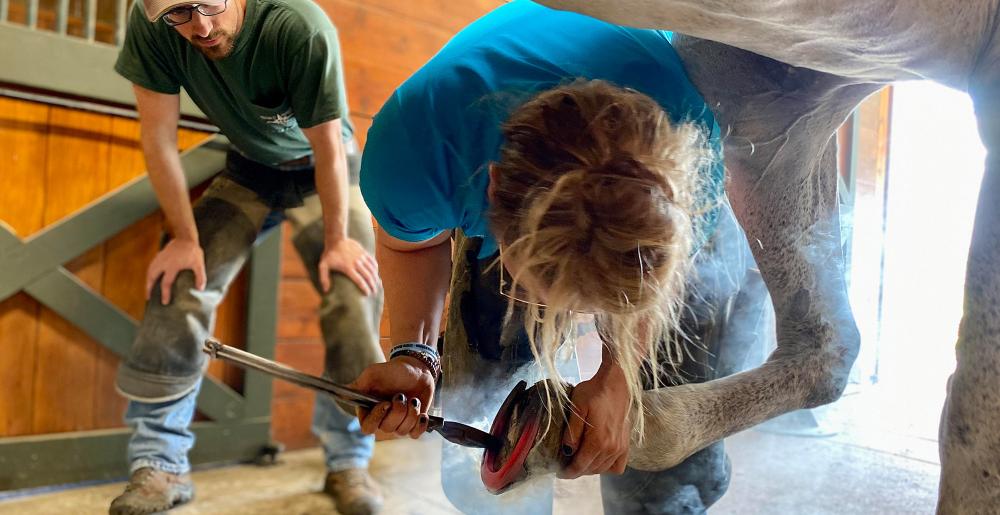
He believed in her.
Steve saw something in Meghan even before she saw it in herself—and he wasn’t alone. Meghan ended up being the only member of her class to get an apprenticeship.
It was the start of a career that would change her life.
Meghan’s apprenticeship was at the Kentucky Horse Park, a bustling facility that welcomes half a million visitors annually.
There, Meghan saw breeds she’d never seen before—Indian Marwari horses, Norwegian Fjords, and Scottish Punches. People from all over the world struck up conversations with her. (Many had never seen a female farrier before.) She worked around all kinds of vets, and she soaked it all in.
She even filled in as Annie Oakley when the horse “Breeds Barn” show was short a rider.
I had to dress up in a Western gown with a fake pistol, long dress, cowgirl hat, and spurs! I rode a Kiger Mustang.
Finding every way possible to keep improving
Wanting to learn as much as she could, Meghan took a part-time job at Rood & Riddle Equine Hospital, working right next to the podiatry barn.
“When horses came back from surgery, it would be my job to help,” she says. “It was so fun to talk to other vets and podiatrists about what the prognosis was, what the treatment plan was going to be, and what I could do to help!
Meghan was building a book of her own, slowly, but she still didn’t feel her skills were where they should be after her apprenticeship. Someone suggested she call the instructors at the Kentucky Horseshoeing School. It was there that she met the people who would help her become a more seasoned farrier: Sam and Kate Gooding.
“I was terrified of Kate,” says Meghan. “She's a very short, petite woman but extremely strong. The first time we spoke in person, I told her, ‘Thank you so much for taking the time to meet with me. Just pretend I don't know anything.’ She said, ‘Don't worry. I will.’”
Meghan was intimidated, but she wanted to take her skills to a new level, and she knew they could help her. She appreciated their no-nonsense approach.
“Kate and Sam did not treat me like a delicate flower. And if I cried, Kate would tell me ‘there's no crying in horseshoeing.’” she says. “If I didn't do something right, they’d say, ‘This was trash. Let's do this again.’”
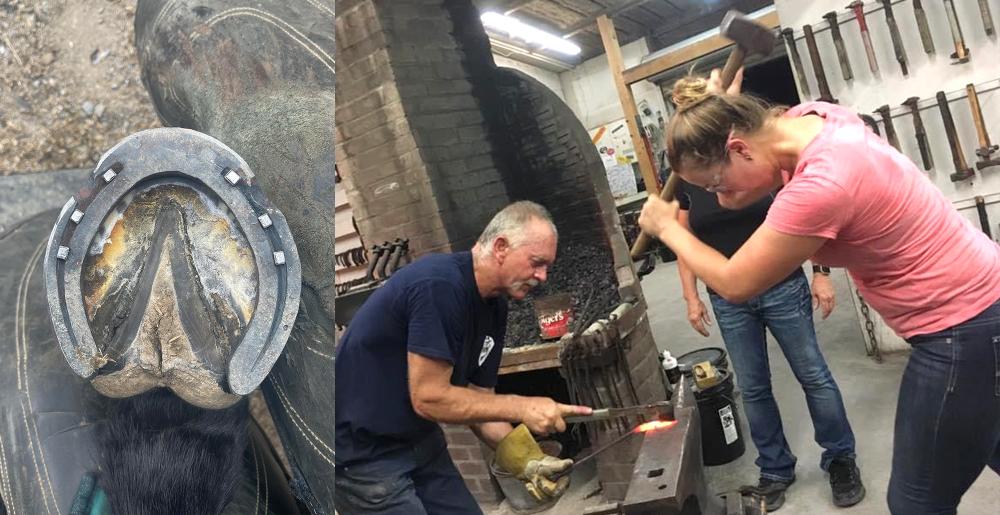
At the time, I thought, ‘Oh, my God, these people are tough.’ Now I think they were and still are the absolute best thing for me, professionally and personally.
True mentors—in work and in life
Meghan met with Sam and Kate every Tuesday. Then, after three years of working together, they told her they’d taken her as far as she could go until she quit her full-time job and became a full-time farrier. At that time, Meghan was making ends meet– while building a clientele list– by working in social work.
The prospect was daunting. Quitting meant losing a weekly paycheck and benefits. But, trusting Kate and Sam, and her own skills, Meghan took the leap.
“Once I did it, I was like, ‘I’m free!’” she says. “And Kate looked at me and said: ‘You're a farrier now.’”
Kate looked at me and said: 'You're a farrier now.'
Kate continued to push Meghan— to enter contests, to win contests, and to get her certification. She saw Meghan’s potential and wanted her to reach it. When Meghan and her husband announced they were expecting a baby, Sam jumped in to help Meghan keep up with her book, delaying a move to Texas to help keep her horses shod.
Meghan continued working alongside Sam throughout her entire pregnancy, even shoeing a horse on Thursday and delivering her daughter, Mara May, the following Saturday.
Sam was thrilled—he was one of the first to hold her baby at the hospital. By then, her mentors had become more than mentors. They were now family.
Always pushing to be better
Not long after, Meghan attempted her first certification and failed. She ran out of time to finish. She buckled down to improve—attending any clinics offered, going to WCB events, and taking up CrossFit to build her endurance.
It paid off.
At her next attempt, she finished with time to spare. Within two years, she’d earned both her CF and her CJF. But for Meghan, the letters behind her name were never the goal. It’s always been about doing the work right.
“I now have apprentices of my own,” she says. “I take being a mentor very seriously. Kate and Sam both showed a great deal of respect and a good hand at the anvil for me, and I want to do the same for the upcoming farriers who want to hang around me. Their work is a reflection of me, so the only option is to always do good work.”
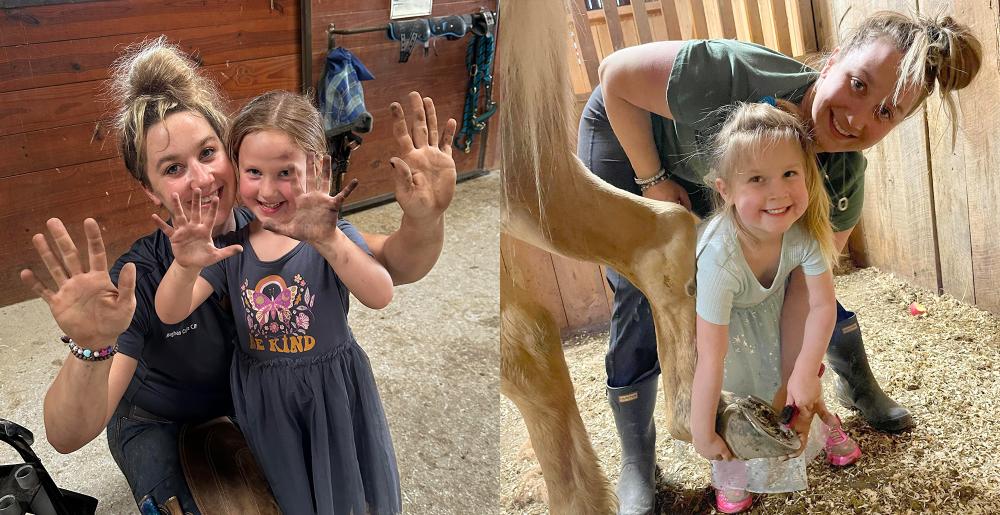
Q&A with Meghan Coyle, CJF
Meghan Coyle has a varied practice in the Lexington, Kentucky area. She works on OTTB show horses, 4H/family horses, fox hunters, mountain shooting horses, and a handful of therapeutic cases. We asked her what she has learned on her journey.
You have a lot of experience collaborating with vets. What would you say to farriers reluctant to work with vets?
I don't think I've ever worked with a vet that said, “You need to do this.” They've suggested something, and I could counter with “This might work better,” and most of the time, they say, “Do what you think is best.” I have a great relationship with all my vets around this area, there is no point in arguing but encouraging us to work together as a team.
Who are your favorite clients?
My first clients, who live an hour from me. In 2013, they owned two horses and a feral donkey. It took me two hours to trim that donkey. But I developed a really good relationship with them. They send me cards every year for Christmas. When my dog died three years ago, they sent me flowers, and when I got married and had a baby, they sent me a gift. He always leaves a little bit of cash and some peppermints. They stuck by me when I was just learning, and I owe it to them to stay with them, even if I no longer shoe in their area anymore.
Do you have a go-to Mustad product?
The Heller eXceL Original. I won’t use any other. A bad rasp can make your job so much harder.
I also enjoy the MX50 Nails, Mustad Equi-Librium shoes, and the new ComfortMix Hoof Cushion ZnO.
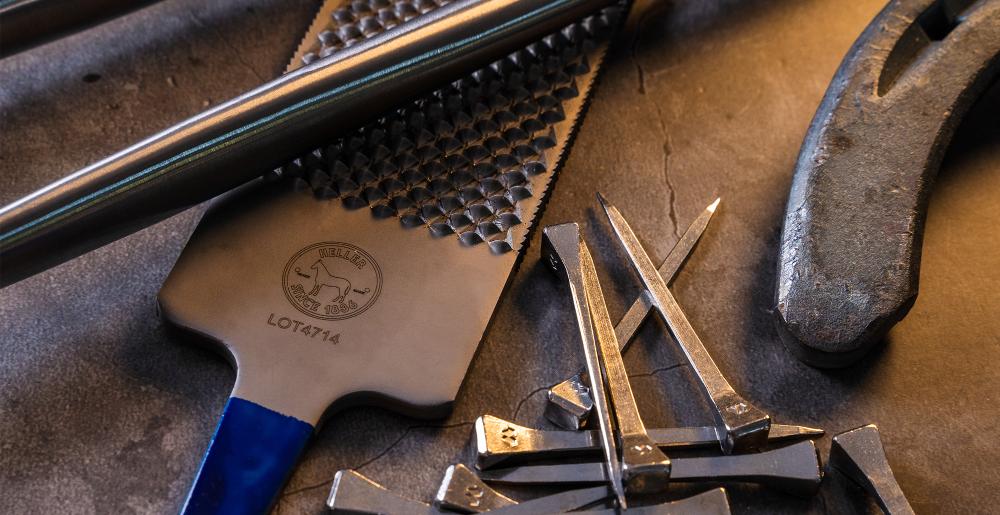
What would you say to your fellow female farriers?
I want to be an advocate for other female farriers who want to start a family. It is doable. Like anything else, you just have to be smart, plan ahead, listen to your body, and lean on your farrier buddies to jump in if you need the help. There is NO shame in asking for help.
What do you do for fun?
From the moment I started making pottery in 2016, I was hooked. I started making bowls and coffee cups. I made anvils, put them on the cups, and posted them online. I cannot believe how many people wanted a cup. Now, I'll post them on Facebook for sale, or I'll donate them to auctions for the AFA.
Austin Eden made me a stamp for my shoes. It’s a coffee cup with an anvil on it and steam coming from the coffee cup. I love it. I don’t make shoes nice enough to use it on, but I use it on my pottery as a signature. I also, LOOOOVE being a momma. My daughter is so fun and keeps me on my toes…She loves coming to work and helping me pick feet.
Kentucky has been central to your career as a farrier. Do you have a community of farriers there?
I do. Some of my Kentucky farrier friends include, Mark Harden CJF, Victor Frisco, CJF, DipWCF, Gauge Morgan CJF, Pat Broadus CJF, Brian Osborne CJF, Conrad Trow CJF, Craig Lessor DVM CF, and outside of KY would be Doug Russo CJF AWCF, and Jennifer DePollo Horne, CJF, who I consult with a few times a month. Jennifer is my inspiration as a businesswoman and a mother.
If you’d like to learn more about Meghan’s services or connect with her personally, you can find her on her Facebook page.
